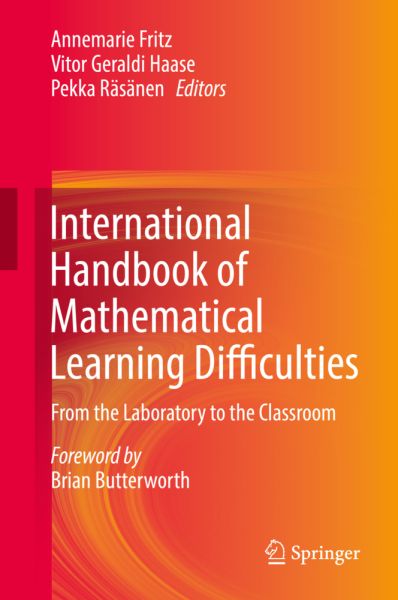International Handbook of Mathematical Learning Difficulties: From the Laboratory to the Classroom
Lieferzeit: 7-14 Werktage
- Artikel-Nr.: 10475551
Beschreibung
Section 1: Development of number understanding: different theoretical perspectives
Chapter 1: Neurocognitive perspective on numerical development
Chapter 2: Everyday context and mathematics learning: on the role on spontaneous mathematical focusing tendencies in the development of numeracy
Chapter 3: Competence Models as a Basis for Defining, Understanding, and Diagnosing Students' Mathematical Competences
Chapter 4: Mathematical performance amongst the poor: Comparative performance across developing countriesChapter 5: Didactics as source and remedy of mathematics learning difficulties
Chapter 6: Section 1 Discussion - Development of number understanding: different theoretical perspectives
Section 2: Mathematics learning and its difficulties around the world
Chapter 7: Special needs education in mathematics: The case of Nordic countries
Chapter 8: Math learning and its difficulties in the Middle European countries
Chapter 9: Mathematics learning and its difficulties in Eastern European countriesChapter 10: Maths Learning and its Difficulties in Southern European Countries
Chapter 11: Mathematics Learning Difficulties in the United States: Current Issues in Screening and Intervention
Chapter 12: Latin-American Countries
Chapter 13: Mathematics Learning and its difficulties: the cases of Chile and Uruguay
Chapter 14: Mathematical inclusion in Southern Africa
Chapter 15: Math Learning Difficulties in Australia
Chapter 16: Mathematical learning and the difficulties in Taiwan: insights from educational practice
Chapter 17: Maths Learning and its Difficulties in Israel
Chapter 18: Learning Difficulties and Disabilities in Mathematics: Indian ScenarioChapter 19: Discussion of Section 2: Math learning difficulties around the world
Section 3: Mathematical learning difficulties and its cognitive, motivational and emotional underpinnings
Chapter 20: Neurobiological origins of mathematical learning disabilities or dyscalculia: A review of brain imaging data
Chapter 21: Genetics of Dyscalculia 1: In search of genes
Chapter 22: Genetics of dyscalculia 2: In search of endophenotypes
Chapter 23: Comorbidity and differential diagnosis of dyscalculia and ADHD
Chapter 24: Working memory and mathematical learning
Chapter 25: The relation between spatial reasoning and mathematics achievement in children with mathematics learning difficulties
Chapter 26: The language dimension of mathematical difficulties
Chapter 27: Motivational and math anxiety perspective for mathematical learning and learning difficulties.
Chapter 28: MATH & EMOTIONS: THE CASE OF MATH ANXIETY
Chapter 29: Cognitive and Motivational Underpinnings of Mathematical Learning Difficulties: A DiscussionSection 4: Understanding the basics: building conceptual knowledge and characterizing obstacles to the development of arithmetic skills
Chapter 30: Counting and Basic Numerical Skills
Chapter 31: Multi-digit Addition, Subtraction, Multiplication, and Division Strategies
Chapter 32: Development of a sustainable place value understanding
Chapter 33: Using Schema-Based Instruction to Improve Students' Mathematical Word Problem Solving PerformanceChapter 34: Geometry
Chapter 35: Understanding Rational Numbers - Obstacles for Learners With and Without Mathematical Learning Difficulties
Section 5: Mathematical learning difficulties: Approaches to recognition and intervention
Chapter 36: Assessing mathematical competence and performance: Quality characteristics, approaches, and research trends
Chapter 37: Diagnostics of dyscalculia
Chapter 38: Three Frameworks for Assessing Responsiveness to Instruction as a Means of Identifying Mathematical Learning DisabilitiesChapter 39: Technology-based diagnostic assessments for identifying early learning difficulties in mathematics
Chapter 40: Small group interventions for children aged 5-9 years old with learning difficulties in mathematics
Chapter 41: Perspectives to technology-enhanced-learning and teaching in mathematical learning difficulties
Chapter 42: Executive Function and Early Math Learning Difficulties
Chapter 43: Children's mathematical difficulties: some contributory factors and interventions
Chapter 44: Beyond the "third method" for the assessment of developmental dyscalculia. Implications for research and practice.Chapter 45: Challenges and future perspectives
Eigenschaften
| Breite: | 162 |
| Gewicht: | 1456 g |
| Höhe: | 238 |
| Länge: | 53 |
| Seiten: | 843 |
| Sprachen: | Englisch |
| Autor: | Annemarie Fritz, Pekka Räsänen, Vitor Geraldi Haase |










 © 2021 Nova Online Media Retailing GmbH
© 2021 Nova Online Media Retailing GmbH